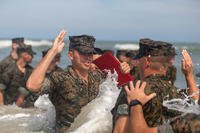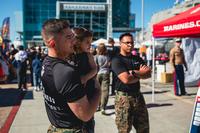WASHINGTON -- The U.S. Department of Defense's American Forces Press Service issued the following news:
This month is Suicide Prevention Month, and Defense Secretary Chuck Hagel has said preventing military suicides is one of the Defense Department's highest priorities.
"As we observe Suicide Prevention Month," he said in a message to the department's workforce, "we must rededicate ourselves to actively working not only every month, but every day to fulfill our collective responsibility to watch out for each other and take care of each other."
This is the second article in a four-part series about a Navy petty officer who came close to taking his own life but did not do so, thanks to the intervention of his leadership and the use of support networks, and how he continues to brave his battle with alcoholism and depression.
Due to emotional and physical abuse as a child, Navy Petty Officer 1st Class Jason Thompson, an instructor at a joint command in Maryland, grew up with suicidal ideations and attempted suicide as early as age 9. He joined the Navy in 1998 and became a mass communication specialist. He said he battled with his depression throughout his Navy career.
Warning Signs
His supervisor and mentor of 11 years said he was a superior performer, but would slip up now and again.
"He was always a phenomenal worker," said Navy Senior Chief Petty Officer Misty Hubbard, the Navy element senior enlisted advisor at the joint command, who has known Thompson for 11 years. "Anything that needed to be done well and quickly went to him, because he could perform like a champ in a pinch. He was always an incredible worker. Ninety-five percent of the time, he was No. 1, on fire, with a bullet -- just an incredible sailor [and] worker. But you could guarantee that about once a quarter, Thompson was going to do something stupid."
In 2012, while Thompson was working at the same joint command as an instructor, Hubbard said three events in Thompson's life were the warning signs for her: he wasn't selected for promotion to chief petty officer, he had a bad break-up in a relationship, and he missed a duty day.
"He didn't get promoted; the relationship ended; those were two big things that happened within a few month's span," she said. "He started oversleeping, showing up unshaven with his uniform not looking its best and then he missed a duty day. He was behaving out of character. These are the sort of things you see from a junior sailor who is struggling to adapt to Navy life. This is not what you see all of a sudden from this senior E-6 who's been in the Navy for 14 years. It went from a slip every three or four months to a screw-up every other week or every week."
Another Navy chief, who was an instructor and drug and alcohol prevention advisor at the joint command in 2012, also noticed signs.
"My first impression of him was that he always displayed himself as an extremely professional, intelligent, charismatic guy, but he started habitually coming to work late," said Navy Chief Mass Petty Officer Herb Banks, now the leading chief for the USS Theodore Roosevelt's media department. "I knew something was wrong, so I fell back and observed him and waited for him to make another mistake or to show another sign or symptom that was inconsistent with his normal behavior."
Looking for 'Hot Buttons'
Banks said he pulled Thompson into his office to ask him what was going on and used his training to ask certain questions to hit hot buttons to make an assessment.
"He started off the conversation by telling me things that were not wrong with him, and that, to me, is a telltale sign that there was something wrong with him," Banks said. "That was a red flag for me."
Thompson said he kept a 'Do Not Do' list of all the signs of someone with suicidal intent and would follow it, but he knew he had slipped up with his conversation with Banks.
"I don't know if that was my subconscious letting it leak, but I know it wasn't intentional on my part," Thompson said. "But I said something to him. And for whatever reason, it stuck, mostly because Chief Petty Officer Banks is not just a good chief, he's a good man. So he caught on."
During this time, Thompson, at age 32, had every intention of jumping off the Duke Ellington Bridge in Washington.
Intervention
Banks said that after his conversation with Thompson and after Thompson had missed the duty day, seven Navy chiefs assigned to the joint command discussed during their weekly meeting how best to handle the situation.
"We were hesitant to bring him in, fearing that we didn't want to do anything that could negatively impact his career," he said. "But at the end of the day, us being chiefs, we put our personal feelings to the side, and we did what we had to do. It wasn't an easy conversation to have with each other, let alone with the individual, but when we say, 'Chief up,' we did, and did what we did for the sake of the sailor. We were going to do whatever we could to keep this guy alive."
"We could have handled it strictly from a discipline standpoint but we would not have resolved this issue," Hubbard said. "We wouldn't have figured out what was causing him to behave this way if we just handled it with paperwork and consequences. So we found a conference room where we could talk with him and not be interrupted."
On Dec. 7, 2012, the seven chiefs sat on one side of a long oval-shaped wooden table and had Thompson report in on the other side to what they had called a professional development board. Thompson called it an intervention.
"I didn't want an intervention; I wanted to die," he said. "I had every intention of saying whatever I had to say to leave that room, because that night, I was going to kill myself."
Hubbard said the setup was intentional, because "Thompson is ridiculously intelligent, and usually the smartest person in the room. One-on-one, he can fool you. If he's talking to two people, he can still do a good job of selling you whatever he thinks you want to hear. But there were seven chiefs in that room. It was the most unfair game of pingpong you've ever seen. One person would try to come at him from one direction, and he would swing and focus on that chief. Then another chief would come in with, 'Well, what about this?'"
Breaking Through the Wall
Thompson held his own in the beginning, Hubbard said, and started with apologies and accepting responsibility for his actions. But then the chiefs broke through his wall.
"The end of it happened very quickly," Hubbard said with tears running down her cheeks. "You could see him starting to get frustrated. One chief asked him, 'Petty Officer Thompson, is there anything you actually do care about?' and another chief asked him, 'Are you thinking about hurting yourself?' He looked like a cornered animal, with his shoulders slumped. He said, 'Every night, I sit at home, and I think about putting a gun in my mouth.'
"We had talked among ourselves about what was going to happen and what direction we thought this thing was going to go," she continued. "One of the chiefs thought there were going to be alcohol-related issues. One chief mentioned we need to be prepared to ask him if he's thinking of hurting himself. I said to the chiefs in the room, 'I've known him for 10 years. If Petty Officer Thompson is going to kill himself, he's not going to tell us. He's just going to do it, and none of us will know.' So when that happened, it [would cause us to say], 'I was wrong.' How could you know somebody for so long and be so wrong?"
The breakthrough was bittersweet, Banks said. "OK, he admitted it. Now, I just need him to say, 'I need some help.' But it was also crushing, too," he explained. "How does someone get to this point in their life? It's hard to imagine that what he had planned almost happened. Had we not done what we needed to do for that sailor, unfortunately, he would have been successful in his attempt."
Thompson said he cried and finally admitted he needed help.
"The chiefs gave me my life back, and I'm just now learning how to live it, really live it, with purpose and clarity, possibility and hope," he said.
The intervention didn't save Thompson's life, Banks said. What saved him, he added, was his admission that he needed help.
"I'm thankful that Thompson was courageous enough on the day of that conversation that he had with us chiefs to admit that he really did have a problem," Banks said. "That is what saved his life. It wasn't what any of us did. He let his wall down at that moment and said, 'Yes, I need some help.' That was one hell of a display of courage, in my opinion. As sharp as he was, as professional as he was, as smart as he was, and as squared-away as he was on the job, at that moment, he needed to take that wall down and ask for help, and he stepped up. And for that, he will have my respect until the day I die."
Thompson agreed. "I saved my life that day," he said. "I had a car ride to Bethesda, and that's when it really started. I was relieved. There was no reason to lie to myself or anybody else anymore."
This is the second article in a four-part series:
- Navy Petty Officer Considers Suicide
- Intervention Saves Suicidal Navy Petty Officer
- Navy Officer Overcomes Suicidal Thoughts with Mental Health Care
- Navy Officer Works Past Depression to Live Fulfilling Life
If you need help, if you know someone who does, or even if you just need someone to talk to, contact the Military Crisis Line via phone, online chat or text message. Just call 1-800-273-8255 and press 1; visit http://www.militarycrisisline.net; or text 838255. It's free, easy and confidential, and trained professionals are there for you 24 hours a day, 365 days a year. For service members and their family members needing support, call Vets 4 Warriors, a 24/7 confidential peer-to-peer support help line run by veterans at 1-855-838-8255, or visit http://www.Vets4Warriors.com. For family members of service members who have lost their lives to suicide, call the Tragedy Assistance Program for Survivors, a 24/7 tragedy assistance resource, at 1-800-959-8277.










